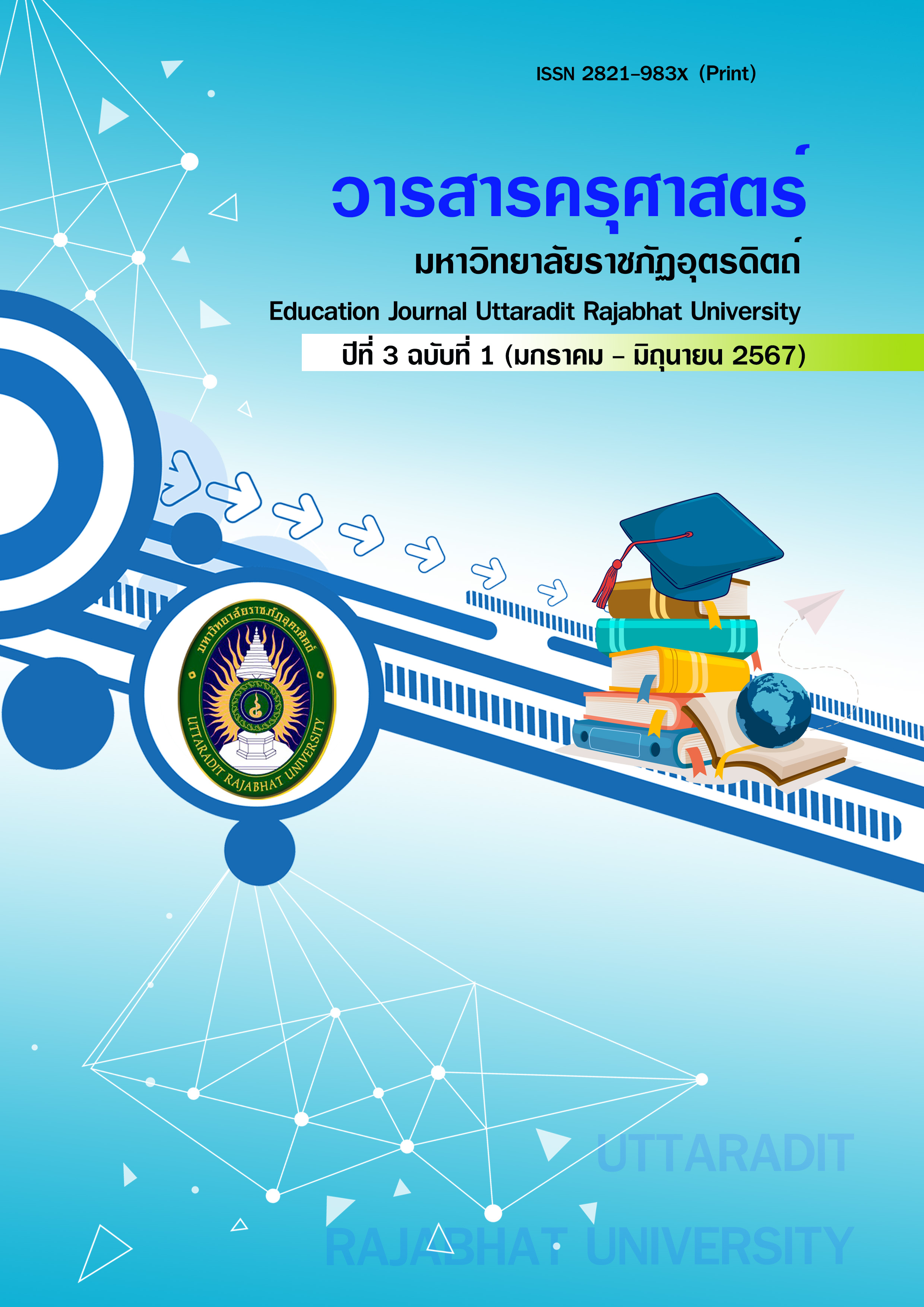Improving the memory of Chinese vocabulary using language games
Main Article Content
Abstract
This research The objectives are 1 ) to develop the achievement in memorizing Chinese vocabulary of Mathayom 3 students at Pa Klang Secondary School. By using language games 2) to study the satisfaction of Mathayom 3 students at Pa Klang High School. Towards learning using language games.
The tools used in this research consisted of 1) 4 language games, 2) pre-class and post- class tests, 3 ) satisfaction assessment of Mathayom 3 students who learned using language games. Used to ask for opinions once, that is, after the experiment, when the sample group has finished studying and doing the post test. data analysis This is done by analyzing the percentage (Percentage), mean (Mean) and standard deviation (Standard Deviation) of the scores obtained from the observation.
The results of the research found that 1 ) the pre- study scores of Mathayom 3 students at Pa Klang High School The average score was 39.2 ( x̅=11.76), but after learning using language games, the students' score was 7 2 . 4 percent ( x̅=21 .72 ) . Therefore, the researcher can conclude that The students had higher scores in remembering Chinese vocabulary after studying than before studying. shows that Developing vocabulary memory using language games makes students have higher academic scores. 2 ) Test of Chinese vocabulary recall before and after class of Mathayom 3 students at Pa Klang Secondary School. The average scores were 11.76 and 21.72 points, respectively. When comparing the scores before and after studying, it was found that the Chinese vocabulary recognition test scores of all students were significantly higher than before studying at the 0.5 level. 3) Results of analysis of satisfaction with learning management using language game media. of Mathayom 3 students at Pa Klang High School Find by average and standard deviation. The results show that students are satisfied with the use of language game media. Overall, it is at a very satisfied level. with a total average of 4.67 The standard deviation is 0.61, indicating that students are satisfied with the learning management at a high level.
keywords: Improving the memory of Chinese vocabulary using language games
Article Details

This work is licensed under a Creative Commons Attribution-NonCommercial-NoDerivatives 4.0 International License.
Faculty of Education Journal Uttaradit Rajabhat University It is a medium for disseminating research results. Academic work Any opinions expressed in the article are solely the personal opinions of the author. Faculty of Education Uttaradit Rajabhat University and the editorial team does not necessarily have opinions that are consistent with those expressed in the article in any way. and is not considered the responsibility of the Faculty of Education Uttaradit Rajabhat University and editorial team
References
คุณิตา เดชะโชติและจาง ซู่คุน. (2561:บทคัดย่อ). ได้ทำการวิจัยเรื่อง การใช้เกมการศึกษา เพื่อพัฒนาความจำด้านคำศัพท์ภาษาจีน.
ณภัทรา นิลเพ็ชร์. (2564:บทคัดย่อ). ได้ทำการวิจัยเรื่อง พัฒนาทักษะในการจดจำคำศัพท์ภาษาจีนของนักเรียนชั้นมัธยมศึกษาปีที่ 1/5 โรงเรียนหนองเสือวิทยาคม ด้วยการสอนโดยเกมบิงโกและวงล้อคำศัพท์.
ประภัสรา โคตะขุน,2564 กล่าวไว้ว่า ภาษาจีน เป็นภาษาที่สำคัญมากภาษาหนึ่ง และมีแนวโน้มที่จะสำคัญยิ่งขึ้นในอนาคต มีการสะสม องค์ความรู้ด้านต่าง ๆ และถ่ายทอดจากรุ่นสู่รุ่นมาถึงปัจจุบันสาธารณรัฐประชาชนจีนยังเป็นประเทศมหาอำนาจที่ทรงอิทธิพลทั้งด้านสังคม เศรษฐกิจ และการเมืองทั้งในระดับภูมิภาคและระดับโลกเป็นประเทศ ที่มีความเติบโตทางด้านเศรษฐกิจสูงเป็นอันดับต้นๆ ของโลก
สุกัญญา ทองแห้ว (2557 : บทคัดย่อ) การพัฒนาความสามารถในการจำคำศัพท์ภาษาจีน โดยการใช้กิจกรรมในรูปแบบของเกม ในรายวิชา จ 2105103 ภาษาจีน 1 กลุ่ม ตัวอย่างคือ นักศึกษาสาขาวิชาภาษาจีนชั้นปีที่ 1 มหาวิทยาลัยราชภัฏเทพสตรี
เหงียน ถิ หญือ อี๊ (2556: บทคัดย่อ) ได้ศึกษาการใช้เกมคำศัพท์ เพื่อพัฒนาการเรียนรู้คำศัพท์ ภาษาไทยของนักศึกษาชั้นปีที่ 1 มหาวิทยาลัยสังคมศาสตร์และมนุษยศาสตร์นครโฮจิมินห์สาธารณรัฐสังคมนิยมเวียดนาม
อาภากร สุวรรณมณี, วัน เดชพิชัยและอริสรา บุญรัตน์ (2565:บทคัดย่อ) ได้ทำการวิจัยเรื่อง ผลการจัดการเรียนรู้คำศัพท์ภาษาจีนโดยใช้เกมที่มีต่อผลสัมฤทธิ์ทางการเรียนกลุ่มสาระการเรียนรู้ภาษาต่างประเทศ (ภาษาจีน) ของนักเรียนชั้นมัธยมศึกษาปีที่ 1


